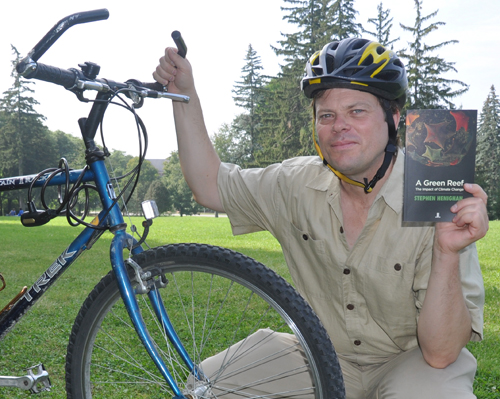
Climate change is often thought of as a scientific discipline, but the humanities can enhance our understanding of the human consequences of global warming, according to Prof. Stephen Henighan, School of Languages and Literatures. The Hispanic studies professor discusses the effects of environmental degradation from a social and cultural perspective in the recently published book A Green Reef: The Impact of Climate Change.
“I’m starting off from the scientific consensus and trying to extrapolate the human consequences of that,” he says. “It’s pretty grim,” he adds, referring to the “cognitive disconnect” between what we know about climate change (a lot) and what we’re willing to do about it (very little).
“There’s a consensus among scientists that the planet is getting warmer, and there’s a consensus among scientists that this is due to human activity,” says Henighan, although he acknowledges that climate change is a hot topic among scientists and non-scientists alike. “The people who disagree with it tend to be people who aren’t scientists. They’re business people or oil executives or economists.”
Although scientists have painted a gloomy picture for the planet, “a humanities perspective is essential to fully understanding the problem and the ways in which we might react to it,” he says. Some of those human consequences include changes to social organization, immigration and languages.
Climate change will force millions of people to leave their homes, says Henighan, including many Americans who will migrate north in search of a more temperate climate. The global migration will change the way we speak. “Some languages will rise, some languages will fall,” he says. As immigrants move to other countries, they will need to speak the dominant language instead of their mother tongue. “A lot of the places where Spanish is spoken will be some of the first places that will be impacted by a rise of two to four degrees Celsius in temperature.”
He predicts the same fate for the Arabic language as many Arabic-speaking countries face environmental challenges.
From a social and historical perspective, the notion of making sacrifices for the good of the country – or the planet – is becoming increasingly unpopular in our individualistic society, he adds. “Now, we’re all incredibly self-centered. That’s a real challenge to collective activity,” which Henighan says is necessary if we’re going to make a difference in the future of the planet.
He blames the media and popular culture for fuelling our dependency on vehicles. “You are defined by what you drive,” says Henighan, who doesn’t own a car, preferring instead to ride his bicycle or take the bus. He recalls a recent visit to Paris, where he saw three well-dressed men in suits on the metro and realized that they probably wouldn’t be seen taking public transit in Canada.
Henighan says he began to pay closer attention to climate change only after his partner, Ana Lorena Leija, who at the time was associate artistic director of Aluna Theatre in Toronto, started to work on a play about climate change. “She read about six consecutive books on climate change and got very, very depressed,” he says. His response was to write a column for Geist magazine in Vancouver, where he is a regular columnist, on the difficulty of knowing about climate change and being unable to act.
The column caught the attention of a German publisher, who asked him to write an extended essay exploring climate change from a “philosophical but non-scientific” point of view. While there are still plans to publish the essay in a German translation, the English edition is now available.
A launch party for A Green Reef will be held at the Bookshelf in downtown Guelph Oct. 8 at 8 p.m.